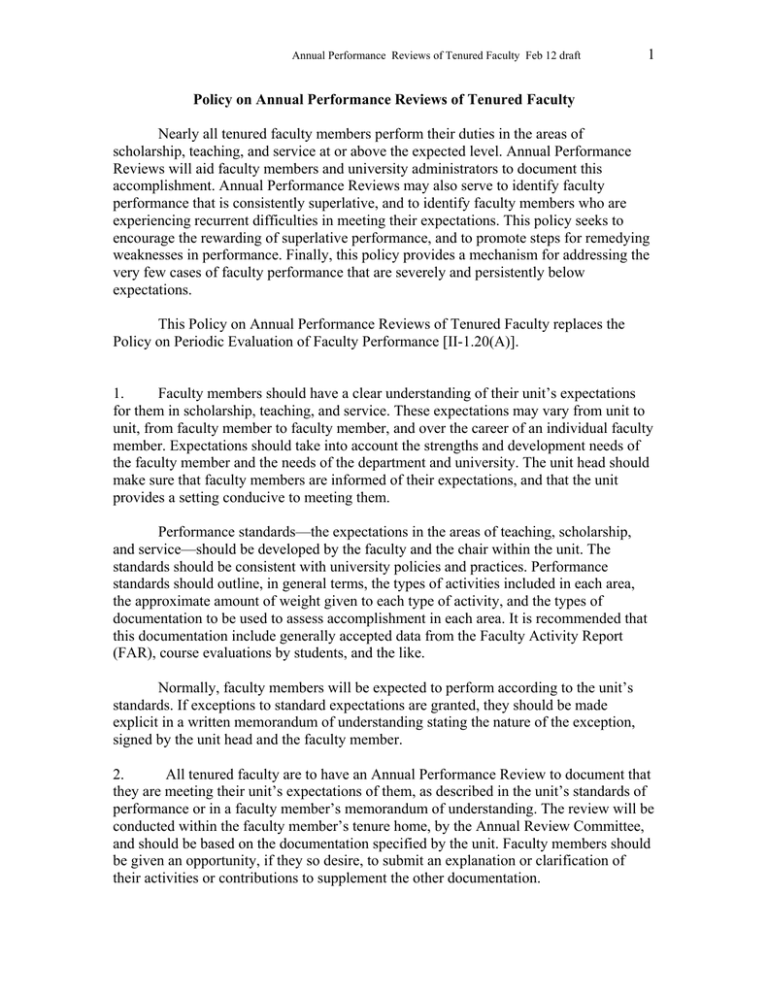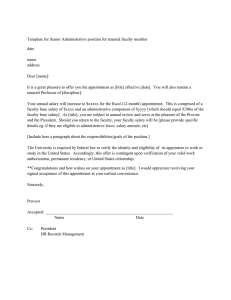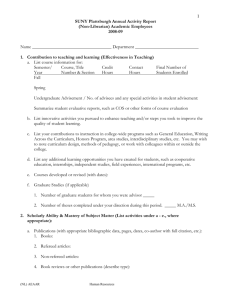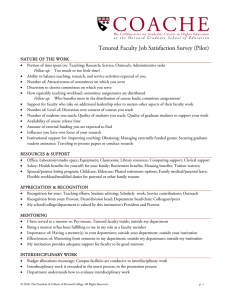1 Nearly all tenured faculty members perform their duties in the... scholarship, teaching, and service at or above the expected level....
advertisement

Annual Performance Reviews of Tenured Faculty Feb 12 draft 1 Policy on Annual Performance Reviews of Tenured Faculty Nearly all tenured faculty members perform their duties in the areas of scholarship, teaching, and service at or above the expected level. Annual Performance Reviews will aid faculty members and university administrators to document this accomplishment. Annual Performance Reviews may also serve to identify faculty performance that is consistently superlative, and to identify faculty members who are experiencing recurrent difficulties in meeting their expectations. This policy seeks to encourage the rewarding of superlative performance, and to promote steps for remedying weaknesses in performance. Finally, this policy provides a mechanism for addressing the very few cases of faculty performance that are severely and persistently below expectations. This Policy on Annual Performance Reviews of Tenured Faculty replaces the Policy on Periodic Evaluation of Faculty Performance [II-1.20(A)]. 1. Faculty members should have a clear understanding of their unit’s expectations for them in scholarship, teaching, and service. These expectations may vary from unit to unit, from faculty member to faculty member, and over the career of an individual faculty member. Expectations should take into account the strengths and development needs of the faculty member and the needs of the department and university. The unit head should make sure that faculty members are informed of their expectations, and that the unit provides a setting conducive to meeting them. Performance standards—the expectations in the areas of teaching, scholarship, and service—should be developed by the faculty and the chair within the unit. The standards should be consistent with university policies and practices. Performance standards should outline, in general terms, the types of activities included in each area, the approximate amount of weight given to each type of activity, and the types of documentation to be used to assess accomplishment in each area. It is recommended that this documentation include generally accepted data from the Faculty Activity Report (FAR), course evaluations by students, and the like. Normally, faculty members will be expected to perform according to the unit’s standards. If exceptions to standard expectations are granted, they should be made explicit in a written memorandum of understanding stating the nature of the exception, signed by the unit head and the faculty member. 2. All tenured faculty are to have an Annual Performance Review to document that they are meeting their unit’s expectations of them, as described in the unit’s standards of performance or in a faculty member’s memorandum of understanding. The review will be conducted within the faculty member’s tenure home, by the Annual Review Committee, and should be based on the documentation specified by the unit. Faculty members should be given an opportunity, if they so desire, to submit an explanation or clarification of their activities or contributions to supplement the other documentation. Annual Performance Reviews of Tenured Faculty Feb 12 draft 2 It is expected that the Annual Performance Review will inform the review for merit pay distribution and in most cases will coincide with it (see University Policy on Merit Pay Distribution [VII-4.00(a)]); the elected Salary Committee would then also serve as the Annual Review Committee. If the academic unit so chooses, it may develop a separate procedure for Annual Performance Reviews, with a separate Annual Review Committee, so long as the separate committee is elected and is representative of the tenured faculty. This separate procedure must be approved by the unit’s faculty in accordance with its Plan of Organization. The Annual Performance Review is the singlemost important mechanism for assessing faculty performance and its significance goes beyond any financial compensation that may result from it. Therefore, the annual review of all tenured faculty should be conducted whether or not merit increases are available. A review for promotion in rank may take the place of the Annual Performance Review. The Annual Review Committee should, in all cases, review the data for the past year. Each unit should determine how many prior years are to be included in the review. One “slow” year should not trigger the conclusion that the faculty member’s performance is substantially below expectations. Similarly, weakness in one area under review should not normally indicate that performance is substantially below expectations. 3. The Annual Review Committee gives the results of the reviews to the unit head, who, after noting his or her acceptance or non-acceptance of them, conveys them to individual faculty members. Every faculty member should be informed of the result of his or her Annual Performance Review, and should have an opportunity to respond to it. 4. A tenured faculty member whose performance in two consecutive Annual Performance Reviews has surpassed expectations in all areas by a wide margin, demonstrating extraordinary accomplishment, should be commended to the dean and the provost. The university should recognize and reward such sustained extraordinary faculty accomplishments either through existing awards and honors or through the development of new rewards, honors, privileges, or other forms of recognition. 5. If, in two consecutive Annual Performance Reviews, a faculty member’s overall performance has been found by the Annual Review Committee to be substantially below reasonable and equitable expectations, and the unit head accepts this conclusion, the unit head must inform the faculty member of that finding. The notification should specify the deficiencies and propose a one-year development plan outlining goals for improvement, suggesting ways that the improvement may be accomplished, and specifying the benchmarks whereby improvement can be assessed. The development plan, to be signed by the unit head and the faculty member, may serve as a memorandum of understanding of expectations for the coming year. The academic unit head, and/or a mentor appointed by the unit head in consultation with the faculty member, should work with the faculty member to improve Annual Performance Reviews of Tenured Faculty Feb 12 draft 3 performance during the time the development plan is in effect. The development plan, any attachments, and evidence of progress towards meeting its goals should be included in the next Annual Performance Review. 6. If, in the Annual Performance Review following the establishment of the development plan, the Annual Review Committee finds that the faculty member’s performance remains substantially below the expectations set for that faculty member, and that insufficient progress has been made to achieve the goals of the development plan, and if the unit head accepts this finding, the case will be brought to the attention of the dean (or provost, if the college is non-departmentalized), together with a recommendation for appropriate action proposed by the unit head. The notification to the dean (or provost) should include a report of the findings, specifying the deficiencies in performance. The faculty member will receive a copy of the notification, a report of findings, and the recommendation for appropriate action. The faculty member should be accorded an opportunity to respond, and any response becomes part of the file. 7. Recommendations for appropriate action after two consecutive reviews in which the faculty member is found to be substantially below expectations may include actions such as more intense efforts to remedy weaknesses in performance, re-assignment of the faculty member’s duties, or the reduction of privileges (such as travel funds). In determining the recommendations for appropriate action, the unit head should consider the needs and responsibilities of the unit and the potential to ameliorate the faculty member’s performance. 8. In a very small number of cases, when prior good-faith efforts to remedy performance have failed, and when other recommendations are deemed inappropriate or not considered likely to produce positive results, the recommendation may be a reduction of a faculty member’s base salary, if the faculty member's performance has declined to such an extent as to no longer to warrant the base salary that is attached to the position. The salary reduction may be permanent or for such time as the dean (or provost) believes appropriate. Prior to implementing a salary reduction, in order to obtain an independent opinion that there are sufficient grounds for a salary reduction, the dean (or provost) shall appoint a three-member Special Review Committee composed of tenured faculty at or above the rank of the faculty member and knowledgeable of the faculty member’s discipline, but not of the same unit as the person under review. The Special Review Committee shall consider the departmental report and may solicit such other information from the unit and the university as it may consider important. The committee shall also offer the faculty member an opportunity to respond in person and/or in writing to the departmental report and recommendations. The committee shall provide the dean (or provost) its written recommendation concerning a salary reduction, namely, whether and why it agrees or not with the recommendation for salary reduction and for the amount and duration of the reduction. The recommendation of the Special Review Committee is advisory to the dean. The decision of the dean (or provost), along with the recommendation of the Special Review Committee, shall be submitted to the provost (or Annual Performance Reviews of Tenured Faculty Feb 12 draft president) for approval. If approved, it shall be communicated to the faculty member, together with a copy of the Special Review Committee’s recommendation. 4


